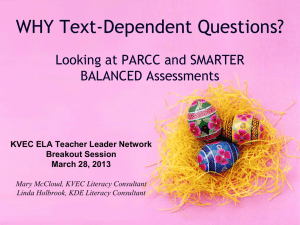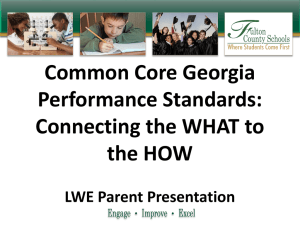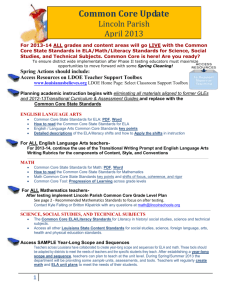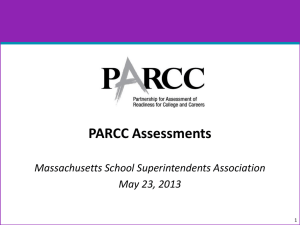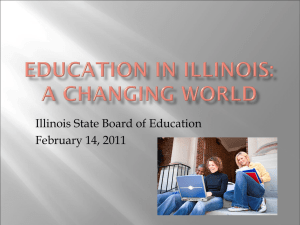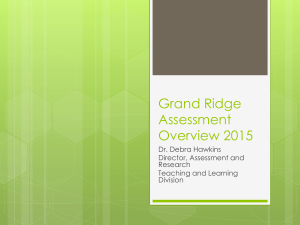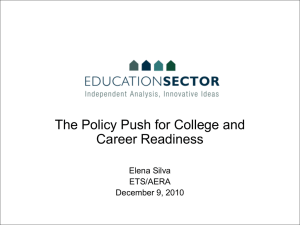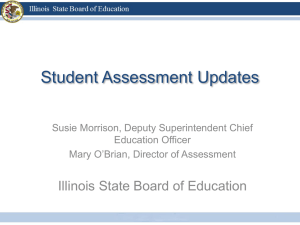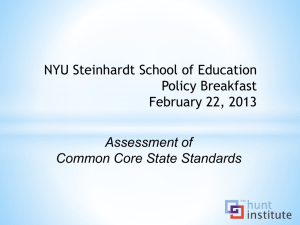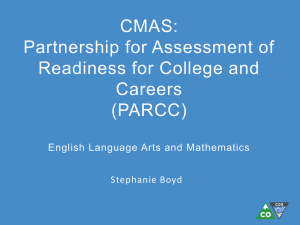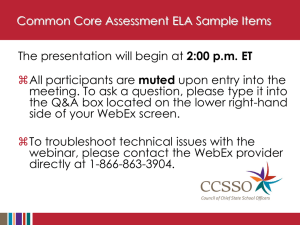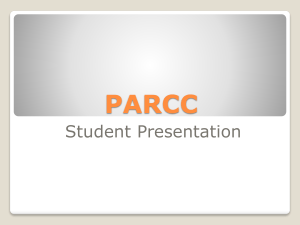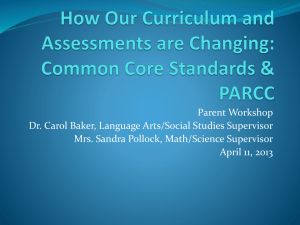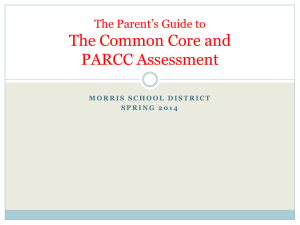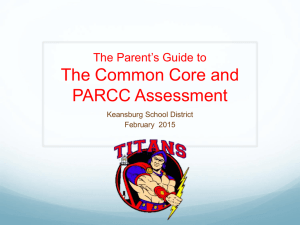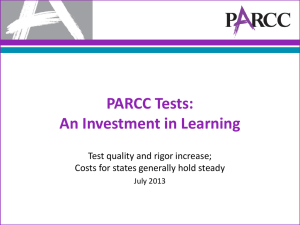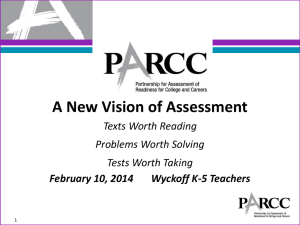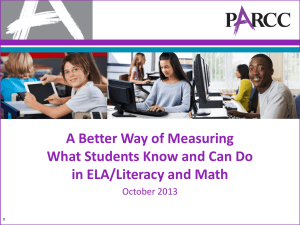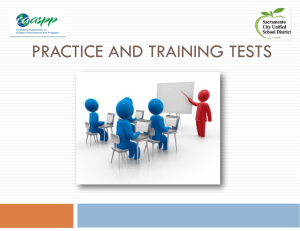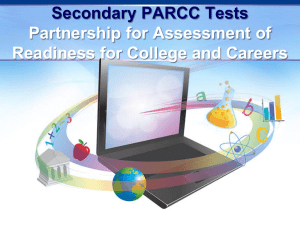A New Vision of Assessment PPT
advertisement
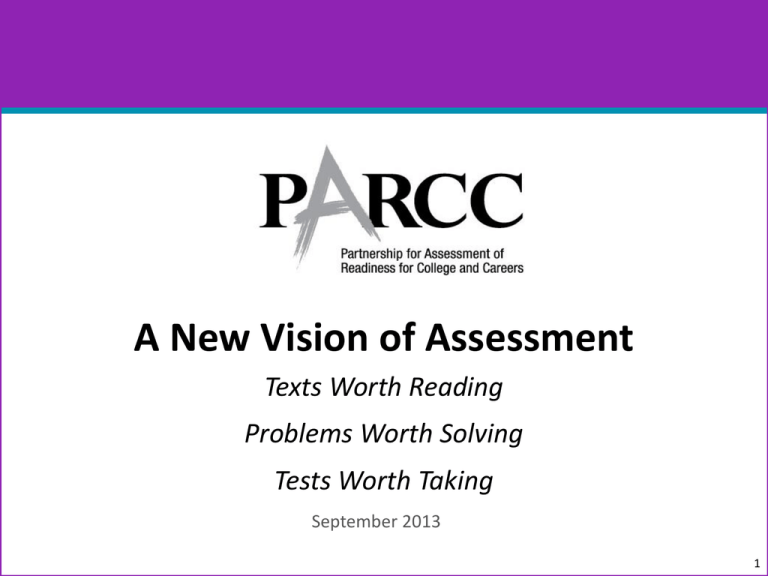
A New Vision of Assessment Texts Worth Reading Problems Worth Solving Tests Worth Taking September 2013 1 What Is PARCC? The Partnership for Assessment of Readiness for College and Careers: Made up of 19 states Developing common, high-quality math and English language arts (ELA) tests for grades 3–11 Computer-based and linked to what students need to know for college and careers For use starting in the 2014–15 school year 2 Why New Assessments Now? We have to prepare all students for college or other postsecondary opportunities: A high school diploma isn’t enough in our 21st century economy Our K–12 system is not adequately preparing students for college 1/3 of 81% of today’s jobs require college or career training college freshmen need remedial courses 3 Personal Benefits: Higher Earnings and Higher Employment Rates $10,308 20% $24,854 12% Mean Income Unemployment Rate $30,171 9% $60,845 5% Source: U.S. Census Bureau (2011). Current Population Survey. Figures are based on the total persons in the civilian labor force. http://www.census.gov/cps/data/cpstablecreator.html 4 Why New Assessments Now? Current state assessments were not designed to: Assess and signal whether students are on track for success in college or careers Produce timely, actionable data for students, teachers and parents Test key skills, such as critical thinking and ability to problem solve 5 Why New Assessments Now? The Common Core State Standards are here: States are implementing these standards for ELA/literacy and math Better standards require better tests High-quality tests improve and inform instruction — they don’t detract from it 6 Why New Assessments Now? Unlike many current tests, PARCC tests will be engaging and will test the critical-thinking and problem-solving skills students need to succeed in school and life. 7 PARCC Priorities 1. Determine whether students are college and career ready or on track 2. Connect to the Common Core State Standards 3. Measure the full range of student performance, including that of high- and low-achieving students 4. Provide educators data throughout the year to inform instruction 5. Create innovative 21st century, technology-based assessments 6. Be affordable and sustainable 8 How Will PARCC Be Different? Students: Will know if they are on track to graduate ready for college/careers Teachers: Will have access to timely data to guide learning and instruction Parents: Will have clear and timely information about student progress States: Will have valid results that are comparable across borders 9 How Will PARCC Be Different? For students: Test quality will mirror high-quality coursework Is computer-based, interactive, engaging Measures the skills and knowledge students need to succeed in college and careers Produces timely information, allowing teachers to tailor instruction to students’ needs Includes embedded supports for English language learners, students with disabilities 10 Embedded Supports Being Discussed Some examples include: Highlighting Customized colors Graphic organizers or representations Captions for audio Home language supports/tools Braille (tactile/refreshable) Signing supports (ASL) Assistive technology 11 How Will PARCC Be Different? For teachers and schools: Computer-based testing will boost student engagement and access More efficient than pencil-and-paper tests Timely data during the year will aid instruction, professional development Tests will assess the full range of student performance, not just students in the middle Tests will measure student growth at all levels as well as focusing on proficiency 12 How Will PARCC Be Different? Help advance our goals: Increased competitiveness in a global economy Higher achievement levels and more opportunities for all students Greater comparability between states Higher college completion, lower remedial rates Better educated citizens 13 Getting All Students College and Career Ready Ongoing student support/interventions K–2 Voluntary K–2 assessment being developed, aligned to the Common Core State Standards Grades 3–8 Timely data showing whether ALL students are on track for college and career readiness High School College readiness score to identify who is ready for college-level coursework Success In first-year, credit-bearing, postsecondary coursework Targeted interventions and supports: • State-developed 12thgrade bridge courses Professional development for educators 14 Assessments ELA/Literacy and Mathematics, Grades 3–11 Beginning of School Year End of School Year Flexible administration Diagnostic Assessment Mid-Year Assessment PerformanceBased Assessment End-of-Year Assessment Speaking and Listening Assessment Key: Optional Required 15 Optional Assessments During the Year Beginning of School Year End of School Year Flexible administration Diagnostic Assessment Flexible indicator of student knowledge and skills Allows instruction, supports and professional development to be tailored to improve student learning Mid-Year Assessment Performance-based items and tasks Emphasis on hard-tomeasure standards Individual states may consider including as a summative component 16 Two Required Assessments Yield Overall Score Beginning of School Year End of School Year PerformanceBased Assessment After 75 percent of the school year Extended tasks, applications of concepts and skills ELA/literacy: Writing effectively when analyzing text, research simulation Math: Solving multistep problems requiring abstract reasoning, precision, perseverance and strategic use of tools End-of-Year Assessment After 90 percent of the school year Innovative, short-answer items ELA/literacy: Reading comprehension Math: Short items that address both concepts and skills 17 Higher Expectations ELA/Literacy Math Read sufficiently complex texts independently Solve problems: content and mathematical practice Write effectively to sources Reason mathematically Build and present knowledge through research Model real-world problems Have fluency with mathematics 18 Math: Grade 3 Sample Item • This a fairly traditional fraction task in a computer-based setting. • Unlike traditional multiple choice, it is difficult to guess the correct answer or use a choice elimination strategy and there is more than one correct solution. • Unlike paper and pencil tests, students can create a visual representation even though the task is scored automatically. 19 Math: Grade 3 Sample Item • Second part of multi-step problem, and, unlike traditional multiple choice, it is difficult to guess the correct answer or use a choice elimination strategy. 20 Math: High School Sample Item Item has two possible solutions Students have to recognize the nature of the equation to know how to solve Technology prevents guessing and working backward 21 ELA/Literacy: Grade 7 Sample Item Students read the text that introduces the topic Items are designed to help students gather information from the texts to lead to the final writing prompt Items require different types of responses to allow students to demonstrate a command of evidence with complex texts 22 ELA/Literacy: Grade 7 Sample Item Earhart and Noonan lived as castaways on Nikumaroro Island. Claims Earhart and Noonan’s plane crashed into the Pacific Ocean People don’t really know where Earhart and Noonan died. Part A: Highlight the claim that is supported by the most relevant and sufficient facts within “Earhart’s Final Resting Place Believed Found.” Part B: Click on two facts within the article that best provide evidence to support the claim selected in Part A. 23 ELA/Literacy: Grade 7 Sample Item 24 Conclusion College or postsecondary career and technical training is essential to earning sustainable wages All high school graduates should be ready to enroll in college courses or similar technical coursework without remediation PARCC assessments will aid student learning, not detract from it We must measure what children learn in school, but we must measure with meaningful assessments In PARCC, students will engage with texts worth reading, problems worth solving, and tests worth taking 25 A New Vision of Assessment September 2013 www.PARCConline.org 26
